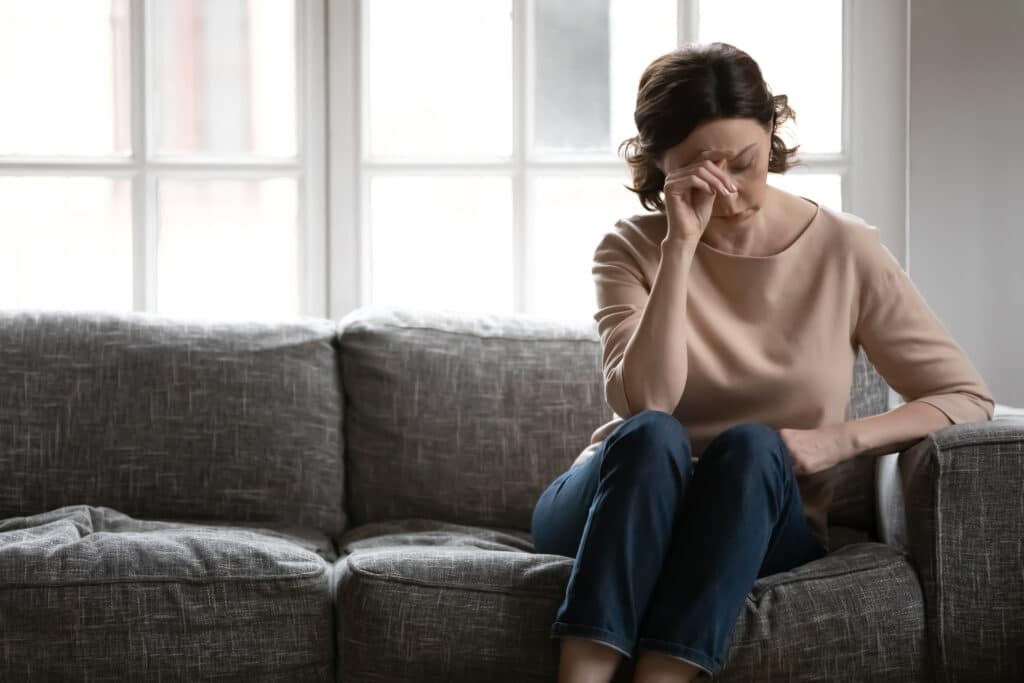Anxiety and depression may be two conditions, but they exist in comorbidity. More expressively, they are closer than you might imagine. Studies show that approximately 90% of people with anxiety disorders are diagnosed with comorbid depression. As a result of the similarity, it is complicated to analyze the conditions and treat them.
Feeling down or anxious happens to everyone. It’s a typical response to stressful events, which indicates a sign of a healthy human being. However, severe anxiety or depression may signal a mental disorder like bipolar. To understand the link between depression and anxiety, you need to understand what anxiety or depression is.
What is Anxiety?
Anxiety is an unpleasant state of mental nervousness or obsession about a futuristic event. It is usually accompanied by a distressing sense of oppression or tightness in the stomach. You may feel anxious about an upcoming job interview, a big test, or a significant decision. The flight or flight center in the brain causes anxiety. This center becomes alerted when we feel frightened, even though there might be no threat.
On the other hand, an anxiety disorder is typified by excessive uneasiness. Physical symptoms like shortness of breath and a racing heart accompany it. Anxiety disorders cause frightening fear about things other individuals would pass over. With anxiety, the worry is temporal. But with anxiety disorders, the nervousness never goes away.
Individuals with anxiety disorders are conscious of their racing thoughts, but they can’t control them. Some anxiety disorders are generalized anxiety disorder, separation disorder, seasonal affective disorder, PTSD, panic disorder, and phobias.
What is Depression?
Depression is a period of low morale, lasting longer than several weeks. It is commonly associated with lasting sadness, despair, and loss of pleasure in activities. Those with depression cannot visualize a happy future, which gives room for suicidal thoughts.
Why Does Anxiety and Depression Co-Occur?
The link between depression and anxiety isn’t complicated. Anxiety and depression exist in a cycle. When you develop anxiety, you have pervasive thinking about a problem. You feel angry and perplexed that you acted poorly on time or delayed. As a result, you feel disappointed, and that’s where depression sets in.
The chance of experiencing depression is higher when an anxiety disorder is present. As mentioned, about 60% of those with clinical depression showed anxiety disorder symptoms.
On the flip side, depressed individuals usually feel anxious. Anxiety is often the trigger. This is true when you consider that individuals with PTSD usually develop depression over time.
If you have an anxiety disorder, speak to a healthcare professional immediately. Further delay could be dangerous, as depression will set in, which complicates treatment.
Symptoms of Anxiety Disorders and Depression
Both anxiety and depression manifest similar signs, such as fatigue, irregular sleep patterns, and loss of appetite. People with major depression may have anxiety as a symptom and vice versa. It proves in many cases that you can have a co-occurring disorder of anxiety and depression simultaneously.
However, anxiety disorders and depression have specific symptoms. For depression, the symptoms may include;
- Persistent sadness and emptiness
- Loss of excitement in activities you once loved
- Worthlessness and self-blame
- Restlessness
- Suicidal thoughts
A person suffering from an anxiety disorder may experience the following symptoms;
- Increased heart rate
- Obsession
- Trembling
- Shortness of breath
Causes of Anxiety Disorders and Depression
Genetics, the environment, and psychological factors cause anxiety disorders. A family with a history of anxiety disorders will pass anxiety disorders to subsequent generations. Traumatic events, imbalances in brain chemicals, and certain medications can lead to anxiety disorders.
Similar factors also cause depression. The symptoms usually manifest in adulthood than in adolescents. Affected individuals will feel overwhelmed by relationship and work problems.
Treatment Options for Anxiety and Depression
Anxiety treatment is not different from depression therapy. Most treatment options that work for anxiety will also be effective against depression. Several evidence-based therapies and treatments can treat both conditions simultaneously. Examples include; cognitive-behavioral therapy (CBT), medication, relaxation techniques, and exercises.
CBT identifies negative thought patterns triggering anxiety and depression in individuals. In turn, it helps them to develop coping methods to manage them.
Prescription medications like antidepressants are often used with CBT to produce more effects. They may have a few side effects, such as vomiting and tiredness.
Mindfulness meditation and deep breathing can minimize anxiety and depression symptoms. These relaxation methods open the body and mind to certain feelings, thus relieving stress, anxiety, and depression.
Satori Health Treats Mental Health Conditions
Treating both anxiety disorders and depression is more effective than individual treatment. Satori Health Center offers integrated care for individuals with these conditions. Our collaborative and comprehensive approach allows us to address all aspects of the person’s life that may have contributed to both mental diseases.If you suspect any symptoms of anxiety and depression, contact us today to find mental health treatment in the San Fernando Valley.



